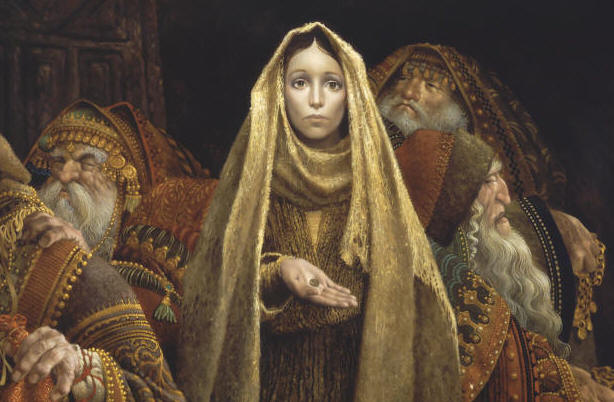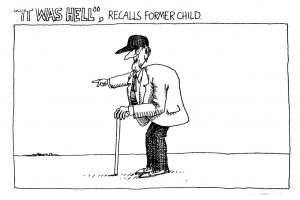United States immigration policies and enforcement are big in the news right now. Some people come to the US illegally, but many come legally and at great personal sacrifice. I have read stories of mothers and fathers leaving their children to come to the US, with the hope that they can eventually bring their children with them. Sometimes families are separated for the rest of their lives as adults make the decision to immigrate and know they will perhaps never see their parents again. These are testimonies to the lure of freedom and the desperation people have to better their lives and, perhaps escape persecution or poverty.
There is another kind of testimony each believer can give: their testimony about the freedom they have in Christ. As believers, we hold citizenship in another country, a better country.
Living with the Promise
Hebrews 11 is known as the Faith Hall of Fame. The writer described faith in verse 1 as “the assurance of things hoped for, the conviction of things not seen,” and then described faith in action using Abel, Noah, Abraham and Sarah. After the interlude of verses 13-16, he describes other faithful people.
All these died in faith, without receiving the promises, but having seen them and having welcomed them from a distance, and having confessed that they were strangers and exiles on the earth. For those who say such things make it clear that they are seeking a country of their own. Hebrews 11:13-14
Abraham was a stranger in a strange land looking for the country God had promised him. He left his home in Ur based on a promise from God and was seeking his country. In light of this faithfulness, consider verse 13: they died never having fully received the promise God had made in verse 1, but they looked to the future and trusted God. Their desire was to pass through this world without taking on its character. Psalm 84:5 tells us: “How blessed is the man whose strength in in You, in whose heart are the highways to Zion!” Regardless of where the highways take us in this world, we must remember we are on a highway to Heaven (there’s an idea for a TV show!).
I have a hiking T-shirt with the saying, “The journey is the destination” on the front. That’s kind of true in hiking, but is it true in the life of a Christian? The journey is wonderful – our lives are gifts from God and we are to glorify Him with our lives – but we do need to be concerned with the destination. These folks mentioned in Hebrews knew they didn’t belong to this world. They were strangers and exiles here. Even Abel, only one generation removed from the Garden, was a stranger. His parents were literal exiles. It’s as if these faithful folks had a homing instinct within them – they knew they were supposed to be somewhere else. These people who trusted God, including Abraham, were not seeking a country of their own; a land for settlement. They were seeking something better. They lived in the light of promises God had made to them, promises they knew would never be realized in their lifetimes. We are in the same state, living with the promise of eternity. We must trust God while walking the path on earth, knowing He will keep his promise to us.
A Better Country
Abraham left Ur of Chaldea on a word from God. He could have gone back if he had become homesick. But that wasn’t his home. Thomas Wolfe had a famous novel published posthumously entitled “You Can’t Go Home Again.” It was about an author who wrote a best-selling novel based on his hometown, but the residents of the town were very unhappy with how he portrayed them, hence the title. Lot’s wife looked back longingly as she left Sodom and was turned into a pillar of salt (Lot’s last name was Morton, by the way). As a believer, you have begun a journey – to follow Christ. We sometimes sing the song, “I Have Decided to Follow Jesus,” that includes the words, “no turning back.” We can turn away from our beliefs and live a life that is not God-honoring. That’s called sin and we all sin. The question is do we repent and get back on the path.
And indeed if they had been thinking of that country from which they went out, they would have had opportunity to return. But as it is, they desire a better country, that is, a heavenly one. Therefore God is not ashamed to be called their God; for He has prepared a city for them. Hebrews 11:15-16
These people desired a better country and the writer names it – Heaven. God honors their faith and is preparing a place for them, and us, to dwell. So what is Heaven like? This other country? We don’t know so I’ll simply say that it will be pure joy because we will be directly in God’s presence and we will experience the fullness of his love. We will fellowship with the entire body of believers and I believe we will continue to grow and learn and work for God. There are various visions of Heaven in Revelation we can consider, but since we’re talking promises, I’ll simply refer to Jesus’ words John 14:1-3.
Ultimate Citizenship
Brethren, join in following my example, and observe those who walk according to the pattern you have in us. For many walk, of whom I often told you, and now tell you even weeping, that they are enemies of the cross of Christ, whose end is destruction, whose god is their appetite, and whose glory is in their shame, who set their minds on earthly things. For our citizenship is in heaven, from which also we eagerly wait for a Savior, the Lord Jesus Christ; who will transform the body of our humble state into conformity with the body of His glory, by the exertion of the power that He has even to subject all things to Himself. Philippians 3:17-21
Paul tells us what ultimate citizenship looks like. One of Aerosmith’s hits was “Walk This Way.” That could be Paul’s theme here: walk like you see me walk. He is not bragging but striving to be faithful in his walk with God. In verse 18, unfortunately, we find that Paul encountered some folks who were not walking with the Lord, but were, in fact, enemies of the cross. What a horrible name for someone – enemy of the cross! The god of these enemies is actually their appetite (arrogance, ego) which led to destruction. The glory they felt they achieved was actually their shame because “they set their mind on earthly things.” In the King James version of the Bible we read that their god was their bellies, i.e., they were focused on filling their needs. F.B. Meyer described these men thusly: “There is no chapel in their life. It is all kitchen.” Paul related this with weeping because of the harm they were bringing to the churches; because of the lives they ruined and the people they turned from God. These people are the antithesis of the faithful ones in Hebrews. They embraced the world and did not trust God and his promises.
Paul also looks toward Heaven. That is where our citizenship lies. Philippi was a colony of Rome, which meant its citizens were considered Roman citizens. Moffat translates the idea of citizenship in Heaven as, “But we are a colony of Heaven.” We are all citizens of earthly governments and the Scriptures tell us we are to be good citizens. But our loyalty, allegiance belongs to God.
I was in Laredo, Texas recently. My hotel backed up to the Rio Grande. I went for a walk one evening and saw people streaming across the bridge in both directions, between Laredo and Nuevo Laredo. I discovered that many people lived in one city and worked in the other. In fact, many held dual citizenship as Americans and Mexicans. The urban area is almost considered one city. In a sense we are dual citizens holding citizenship here on earth and also in the kingdom of God. There is tension in this: we live in this world while representing another.
Paul has great expectations: In verse 20 he doesn’t mean we are still waiting for our Savior – he’s already completed the saving work. We are eagerly awaiting what the Savior will do when we join him, which we see in verse 21 – He will transform us into glorious new bodies. He has the power to do this and anything and everything.
Citizens of Heaven impacting Earth
As citizens of heaven God expects us to have an impact on the world we live in. In Matthew 5:14-16 Jesus said, “You are the light of the world. A city set on a hill cannot be hidden; nor does anyone light a lamp and put it under a basket, but on the lampstand, and it gives light to all who are in the house. Let your light shine before men in such a way that they may see your good works, and glorify your Father who is in heaven.” We cannot isolate ourselves from the world. We must meet people where they are. We need to be more intentional as individuals and as churches in going out. What risk is there in staying quiet and keeping to ourselves? German pastor Martin Niemoller wrote this in October of 1945 based on the fact that he initially ignored the Nazis and their activities:
First they came for the Socialists, and I did not speak out
because I was not a Socialist.
Then they came for the Trade Unionists, and I did not speak out –
Because I was not a Trade Unionist.
Then they came for the Jews, and I did not speak out –
Because I was not a Jew.
Then they came for me – and there was no one left to speak for me.
In Matthew 25, Jesus gives us instruction for living as citizens of the world and citizens of His kingdom. It is the well-known passage that begins “For I was hungry…” We are to minister in His name as we walk through the world. How can we not do the work of ministry? Don’t think of ministry as a big exalted word. “A cup of cold water” given in His name is ministry. Ministry is meeting people and serving them, sharing with them, loving them. Your American citizenship comes with certain rights, protections and responsibilities. Your heavenly citizenship comes with great responsibility.
Many years ago I stood in front of a crusty Coast Guard Master Chief and said these words: I do solemnly swear that I will support and defend the Constitution of the United States against all enemies, foreign and domestic; that I will bear true faith and allegiance to the same; and that I will obey the orders of the President of the United States and the orders of the officers appointed over me, according to regulations and the Uniform Code of Military Justice. So help me God.
Sometime later I stood in front of a crusty Admiral and said these words: I, having been appointed an officer in the Coast Guard of the United States, as indicated above in the grade of Ensign, do solemnly swear that I will support and defend the Constitution of the United States against all enemies, foreign and domestic, that I will bear true faith and allegiance to the same; that I take this obligation freely, without any mental reservations or purpose of evasion; and that I will well and faithfully discharge the duties of the office upon which I am about to enter; So help me God.”
Years before, my father stood over me and said these words: I baptize you my son in the name of the Father, and of the Son, and of the Holy Spirit.
The oaths were important to me and governed my behavior for 25 years of my life. But the words of my father and pastor, though not an oath, were symbolic of the promise I made to Jesus when I accepted him as my Savior, and of His promises to me. Those words represent an eternal impact.
At present, we do not have to make a choice between being citizens of whatever city, county, state or country we live in and being citizens of Heaven. But many of our brothers and sisters around the world are faced with that choice. We often hear it said, “I know my rights!” Here are your rights: “All have sinned and fall short of the glory of God;” and “The wages of sin is death.” But here is your privilege: “But the free gift of God is eternal life in Christ Jesus our Lord.” If you are an American, I encourage you to be a good American and citizen; to be a patriot. But God commands your ultimate allegiance as a citizen of His kingdom.




 In three days this past weekend, three people were shot to death in my hometown of Jacksonville and many others were injured by gunfire. One was killed after a high school football game and two were killed while playing in a video game tournament.
In three days this past weekend, three people were shot to death in my hometown of Jacksonville and many others were injured by gunfire. One was killed after a high school football game and two were killed while playing in a video game tournament.